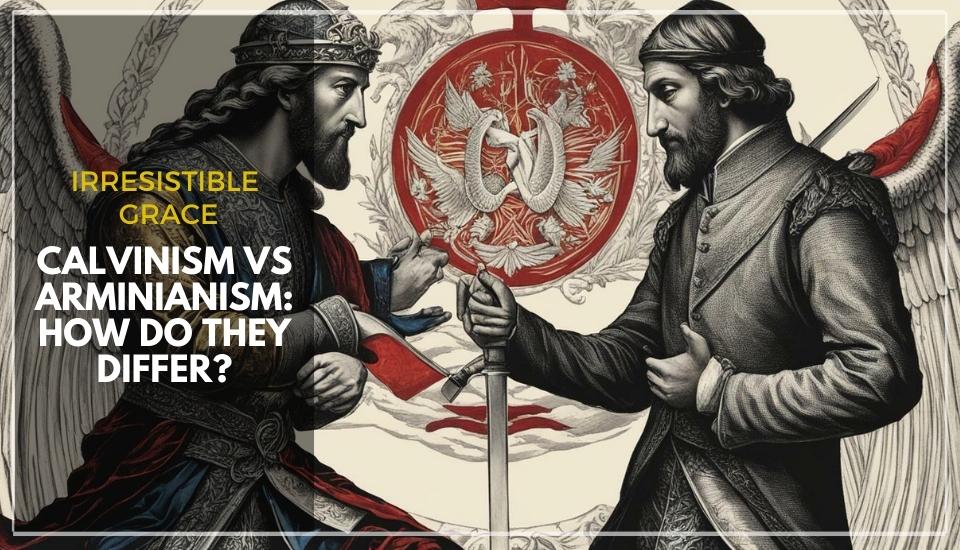What You’ll Learn
Key Takeaways: Calvinism vs Arminianism
- Origins: Born in the 16th century, Calvinism and Arminianism derive their names and doctrines from John Calvin and Jacobus Arminius respectively.
- Core Beliefs:
- Calvinists stress total depravity, unconditional election, limited atonement, irresistible grace, and the perseverance of the saints.
- Arminians emphasize free will, resistible grace, conditional election, and the possibility for believers to fall away.
- Modern Impact: Their teachings, particularly influential in the United States, continue to shape theological discussions and church practices today.
- Notable Figures: Beyond Calvin and Arminius, figures like John Wesley and modern theologians like John Piper have significantly influenced these discussions.
Unraveling the Theological Tapestry: Calvinism Vs Arminianism
When delving into the world of Christian theology, the debate about Calvinism vs Arminianism stands out as one of the most divisive discussions in the history of the church. It’s a conversation that spans centuries and has shaped the beliefs of countless believers.
Brief overview of the historical and theological significance of the debate
The theological debate between Calvinism and Arminianism is not just a matter of academic interest. It touches on the very nature of salvation, God’s grace, and man’s free will. These theological issues, deeply rooted in the 16th century, have continued to influence different denominations and shape the broader Christian worldview.
| Theological Aspect | Calvinism | Arminianism |
|---|---|---|
| View of Salvation | Sovereign choice of God | Man’s free choice with God’s grace |
| Types of God’s Grace | Irresistible | Resistible |
| Predestination | Unconditional | Conditional based on his foreknowledge |
The importance of understanding the differences and similarities between Calvinism and Arminianism
Understanding the nuances between Calvinism and Arminianism is crucial for several reasons:
- It provides insights into the foundational beliefs of many Christian denominations.
- The debate underscores the rich tapestry of theological perspectives within Christianity.
- Exploring these doctrines can deepen a believer’s faith and understanding of God’s sovereignty.
Historical Background

Delving deeper into the debate of Calvinism vs Arminianism, it becomes essential to understand the historical context that gave rise to these theological perspectives.
Origins of Calvinism and its main proponent, John Calvin
Calvinism, known as the reformed tradition, finds its roots in the teachings of the French theologian John Calvin and the five points. Originating in the turbulent times of the Reformation in the 16th century, Calvinism emphasized the sovereignty of God in all things, especially salvation. John Calvin’s teachings, particularly in the United States and parts of Europe, laid the foundation for many Protestant denominations.
Key Points:
- Calvinism sees the total depravity of man.
- It believes in the sovereignty of God in determining salvation.
- John Calvin, the foundation of this theology, wrote extensively on predestination and God’s eternal decree.
Origins of Arminianism and its main proponent, Jacobus Arminius
Arminianism, on the other hand, emerged as a response to the rigid doctrines of Calvinism. Led by the Dutch theologian Jacobus Arminius, Arminianism stressed man’s free will and the conditional nature of election. Arminius and his followers posed five articles of remonstrance, challenging the prevailing Calvinistic views of the time.
Key Points:
- Arminianism emphasizes man’s free choice.
- Jacobus Arminius, the central figure, believed in conditional predestination based on his foreknowledge.
- Arminian theology sees salvation as resistible grace of God.
The rise of English Arminianism in the Elizabethan times
English Arminianism gained prominence during the Elizabethan era, marked by figures like John Wesley. This movement, though rooted in Arminianism, evolved with distinctive characteristics, particularly emphasizing a believer’s ability to fall away or lose their salvation.
Key Points:
- English Arminianism was not just a theological stance but also a political and ecclesiastical movement.
- John Wesley, a significant figure, played a pivotal role in its spread, emphasizing the authority of scripture and the believer’s sanctification.
Core Doctrines Compared

The heart of the Calvinism vs Arminianism debate lies in their respective core doctrines. These doctrines shape the foundational beliefs about human nature, God’s grace, and the path to salvation.
Total Depravity vs. Free Will
Calvinism: The belief in total depravity and the inherent sinfulness of humanity
Calvinism holds that humanity is tainted by sin in every aspect of their being: body, soul, and mind. This total depravity means that without divine intervention, humans cannot choose God or good.
Arminianism: The emphasis on free will and the ability of humans to choose salvation
Arminianism, in contrast, acknowledges human sinfulness but emphasizes that humans, through the grace of God, have the free will to accept or reject salvation. This is often referred to as “prevenient grace.”
Scriptural references and interpretations supporting each view
| Doctrine | Scriptural Support |
|---|---|
| Total Depravity | Romans 3:10-12, Ephesians 2:1-3 |
| Free Will | John 3:16, Joshua 24:15 |
Perseverance of the Saints vs. Falling from Grace
Calvinism: The belief that those truly saved will persist in their faith
Calvinists believe that once a person is saved, they cannot lose their salvation. This doctrine, known as “perseverance of the saints,” asserts the eternal security of the believer.
Arminianism: The possibility of falling from grace and losing salvation
Arminians believe that believers can turn away or “fall from grace.” Salvation, in this view, requires continual faith and commitment.
Scriptural references and interpretations supporting each view
| Doctrine | Scriptural Support |
|---|---|
| Perseverance of the Saints | John 10:28-29, Philippians 1:6 |
| Falling from Grace | Hebrews 6:4-6, 2 Peter 2:20 |
Resistible vs. Irresistible Grace
Calvinism: The belief in irresistible grace, where God’s call to salvation cannot be resisted
For Calvinists, when God calls someone to salvation, this call is irresistible. The individual cannot resist God’s grace and will inevitably come to faith.
Arminianism: The belief in resistible grace, where individuals can resist the Holy Spirit’s call
Arminians hold that God’s grace can be resisted. While God calls everyone to salvation, individuals have the free choice to accept or reject this call.
Scriptural references and interpretations supporting each view
| Doctrine | Scriptural Support |
|---|---|
| Irresistible Grace | John 6:44, Romans 8:30 |
| Resistible Grace | Acts 7:51, Matthew 23:37 |
The Great Debate: Implications for Salvation

At the center of the Calvinism vs Arminianism debate is the profound question of how salvation is achieved and maintained.
Examination of the debate on human salvation from both Calvinist and Arminian perspectives
Calvinism posits that salvation is solely the work of God, from election to glorification. Human effort or will plays no role in one’s salvation. Calvinists believe that God elects individuals to salvation based on His sovereign will, not on any merit or foreseen faith in the individual.
Arminianism, however, views salvation as a collaborative process. While God offers grace freely to all, it is up to individuals to accept or reject it. In this view, God’s foreknowledge allows Him to predestine individuals to salvation, but this predestination is conditional upon the individual’s response to God’s grace.
The role of faith, works, and God’s sovereignty in salvation
- Calvinistic View:
- Faith is a gift from God, not a human effort.
- Good works are the result of salvation, not a means to achieve it.
- God’s sovereignty means He has chosen the elect from the foundation of the world.
- Arminian View:
- Faith, while aided by God’s grace, requires human response.
- Good works, while not earning salvation, demonstrate genuine faith.
- God desires everyone to be saved and responds to our free choices.
Notable Figures and Their Views
Throughout the history of the Calvinism vs Arminianism debate, various theologians and church leaders have contributed their insights and interpretations, leaving lasting legacies on the theological landscape.
A.W. Tozer’s perspective on Calvinism and Arminianism
A.W. Tozer, a revered 20th-century theologian, is often cited in discussions about Calvinism and Arminianism. While he never strictly aligned himself with either camp, Tozer’s writings suggest a middle ground. He acknowledged the sovereignty of God, a Calvinistic view, but also emphasized the responsibility of the individual, an Arminian perspective. Tozer believed in the deep mysteries of God’s nature and often suggested that human understanding is limited in comprehending the fullness of God’s sovereignty and man’s free will.
Dr. Graham Scroggie’s stance and contributions to the debate
Dr. Graham Scroggie was another influential figure who contributed to this theological debate. While he held Calvinistic views on certain doctrines, he diverged from strict Calvinism in others. Scroggie often emphasized the importance of the authority of scripture and believed that both Calvinists and Arminians could find common ground in the Bible. He was known for advocating a balanced view, believing that focusing too heavily on divisive debates detracted from the essential message of Christ’s love and salvation.
Modern Perspectives and Variations

The debate between Calvinism and Arminianism hasn’t remained static. Over the years, various theologians and Christian movements have developed nuanced interpretations and variations of these core beliefs, reflecting the evolving nature of theological thought.
The variations within Calvinism and Arminianism in contemporary theology
Modern Calvinistic perspectives, often influenced by theologians like John Piper, have sometimes deviated from traditional five-point Calvinism. These variations might emphasize different aspects of the original doctrines or integrate newer theological insights.
On the other side, contemporary Arminianism has also seen its share of variations, particularly in how it approaches topics like eternal security and the nature of God’s foreknowledge. These developments show the dynamic nature of the debate and its adaptability to changing times and cultural contexts.
Key Modern Variations:
- Neo-Calvinism: A movement that integrates Calvinistic soteriology with charismatic worship and mission-focused church practices.
- Open Theism: An Arminian offshoot that posits that God’s foreknowledge is limited, allowing for genuine human free will.
The impact of the debate on modern Christian denominations and beliefs
The Calvinism vs Arminianism debate has significantly shaped modern Christian denominations. While some denominations firmly align with one perspective, others have sought a middle ground.
This has led to a rich tapestry of beliefs, where denominations might integrate elements from both theological systems. The debate’s impact extends beyond theology, influencing worship practices, evangelistic strategies, and the believer’s daily walk with God.
If You Want Results-Focused Consulting or an Unforgettable Speaker, Inquire About Booking Dr. Jackson Today.
Bridging Centuries of Debate: Reflecting on Calvinism vs Arminianism
The Calvinism vs Arminianism discourse has spanned centuries, shaping theological thought, church practices, and personal beliefs. Despite the passage of time, its relevance remains undiminished in contemporary Christian circles.
The ongoing relevance of the Calvinism vs Arminianism debate in Christian theology
While originating in the 16th century, the core issues of this debate continue to resonate today. The questions of God’s sovereignty, man’s free will, and the nature of salvation are as pertinent now as they were during the times of John Calvin and Jacobus Arminius. The ongoing relevance of this debate underscores the depth and complexity of these theological issues.
Modern discussions often revolve around:
- The interplay between God’s grace and human agency in salvation.
- The implications of these beliefs for evangelism and missions.
- The personal ramifications for believers in their relationship with God.
Dive deeper into the scriptures to form your own understanding
While theological discussions can provide insights, the true foundation lies in the scriptures.
Both Calvinists and Arminians emphasize the authority of scripture in forming their beliefs. It’s essential for believers to dive into the Bible, seek guidance from the Holy Spirit, and form their understanding.
The Calvinism and Arminianism debate serves as a starting point, inviting everyone to a deeper exploration of God’s word.
- Calvinism is a theological system developed by John Calvin, a 16th century French theologian, while Arminianism is a theological system developed by Jacobus Arminius, a 17th century Dutch theologian.
- Calvinism emphasizes the sovereignty of God, while Arminianism emphasizes the free will of humans.
- Calvinism teaches that salvation is by grace alone, while Arminianism teaches that salvation is by grace and human effort.
- Calvinism teaches that God predestines some people to be saved and some to be damned, while Arminianism teaches that God predestines all people to be saved.
- Calvinism teaches that faith is a gift from God, while Arminianism teaches that faith is a human response to God’s grace.
- Calvinism teaches that God’s grace is irresistible, while Arminianism teaches that God’s grace can be resisted.
- Calvinism teaches that God’s grace is unconditional, while Arminianism teaches that God’s grace is conditional.
- Calvinism teaches that Jesus died for the elect only, while Arminianism teaches that Jesus died for all people.
- Calvinism teaches that the atonement is limited, while Arminianism teaches that the atonement is unlimited.
- Calvinism teaches that the Holy Spirit regenerates the elect only, while Arminianism teaches that the Holy Spirit regenerates all people.
- Calvinism teaches that believers can never lose their salvation, while Arminianism teaches that believers can lose their salvation.
- Calvinism teaches that good works are the result of salvation, while Arminianism teaches that good works are the evidence of salvation.
- Calvinism teaches that God’s grace is irresistible, while Arminianism teaches that God’s grace can be resisted.
- Calvinism teaches that God’s grace is unconditional, while Arminianism teaches that God’s grace is conditional.
- Calvinism teaches that believers are eternally secure, while Arminianism teaches that believers are not eternally secure.
- Calvinism teaches that God’s grace is irresistible, while Arminianism teaches that God’s grace can be resisted.
- Calvinism teaches that God’s grace is unconditional, while Arminianism teaches that God’s grace is conditional.
- Calvinism teaches that believers are predestined to be saved, while Arminianism teaches that believers are not predestined to be saved.
- Calvinism teaches that believers are justified by faith alone, while Arminianism teaches that believers are justified by faith and works.
- Calvinism teaches that believers are adopted into God’s family, while Arminianism teaches that believers are adopted into God’s family through faith.
- Calvinism teaches that believers are sanctified by the Holy Spirit, while Arminianism teaches that believers are sanctified by the Holy Spirit and their own efforts.
- Calvinism teaches that believers are kept by the power of God, while Arminianism teaches that believers are kept by the power of God and their own faithfulness.
- Calvinism teaches that believers are glorified by God, while Arminianism teaches that believers are glorified by God and their own works.
Calvinism and Arminianism are two distinct theological systems that have been in debate for centuries. Calvinism is a system of belief based on the teachings of John Calvin, a 16th century French theologian. It emphasizes the sovereignty of God, predestination, and the absolute depravity of man. Arminianism, on the other hand, is a system of belief based on the teachings of Jacobus Arminius, a 17th century Dutch theologian. It emphasizes the free will of man, the possibility of salvation for all, and the conditional election of God.
The debate between Calvinism and Arminianism began in the early 17th century when Arminius began to challenge the teachings of Calvin. Arminius argued that man had the free will to choose salvation, while Calvin argued that man was predestined to either be saved or damned. This debate continued for centuries, with both sides having passionate supporters.
Today, Calvinism and Arminianism are still debated among theologians and laypeople alike. While both systems have their strengths and weaknesses, it is important to remember that both systems are rooted in the same core beliefs of Christianity. Ultimately, it is up to each individual to decide which system best fits their own beliefs and understanding of the Bible.
- Calvinism emphasizes the sovereignty of God, while Arminianism emphasizes the free will of humans.
- Calvinism teaches that salvation is by grace alone, while Arminianism teaches that salvation is by grace and human effort.
- Calvinism teaches that God predestines people to salvation, while Arminianism teaches that people can choose to accept or reject salvation.
- Calvinism teaches that God’s grace is irresistible and unconditional, while Arminianism teaches that God’s grace is resistible and conditional.
- Calvinism teaches that God’s grace is limited, while Arminianism teaches that God’s grace is unlimited.
- Calvinism teaches that God’s grace is given to the elect, while Arminianism teaches that God’s grace is available to all.
- Theological differences between Calvinism and Arminianism
- The historical context of each belief system
- The implications of each belief system on one’s faith
- The impact of Calvinism and Arminianism on the church
- The role of scripture in each belief system
- The role of grace in each belief system
- The role of free will in each belief system
- The role of predestination in each belief system
- The role of the Holy Spirit in each belief system
- The role of faith in each belief system
- The role of works in each belief system
- The role of the church in each belief system
- The role of the sacraments in each belief system
- The role of the atonement in each belief system
- The role of the afterlife in each belief system
- The role of the church in the world in each belief system
- The role of evangelism in each belief system
- The role of prayer in each belief system
- The role of the Holy Spirit in the world in each belief system
- The role of the church in the spiritual life in each belief system
- The role of the church in the mission of God in each belief system
- The role of the church in the mission of the church in each belief system
- The role of the church in the mission of the world in each belief system
- The role of the church in the mission of the kingdom of God in each belief system
- The role of the church in the mission of the kingdom of heaven in each belief system
- The role of the church in the mission of the kingdom of righteousness in each belief system
- The role of the church in the mission of the kingdom of justice in each belief system
- The role of the church in the mission of the kingdom of peace in each belief system
- The role of the church in the mission of the kingdom of love in each belief system
- The role of the church in the mission of the kingdom of joy in each belief system
- The role of the church in the mission of the kingdom of hope in each belief system
- The role of the church in the mission of the kingdom of faith in each belief system
- The role of the church in the mission of the kingdom of mercy in each belief system
- The role of the church in the mission of the kingdom of grace in each belief system
- The role of the church in the mission of the kingdom of truth in each belief system
- The role of the church in the mission of the kingdom of life in each belief system
- The role of the church in the mission of the kingdom of salvation in each belief system
- The role of the church in the mission of the kingdom of glory in each belief system
- The role of the church in the mission of the kingdom of holiness in each belief system
Grace Ambassador: Bringing Heaven To Earth
As believers, we have received unimaginable grace from the Father. Unfortunately, we often separate our spiritual life from our everyday lives. We fail to value the grace given to us, and we miss the opportunity to bring heaven to earth. Then we wonder what light we can bring to a world in deep darkness.




